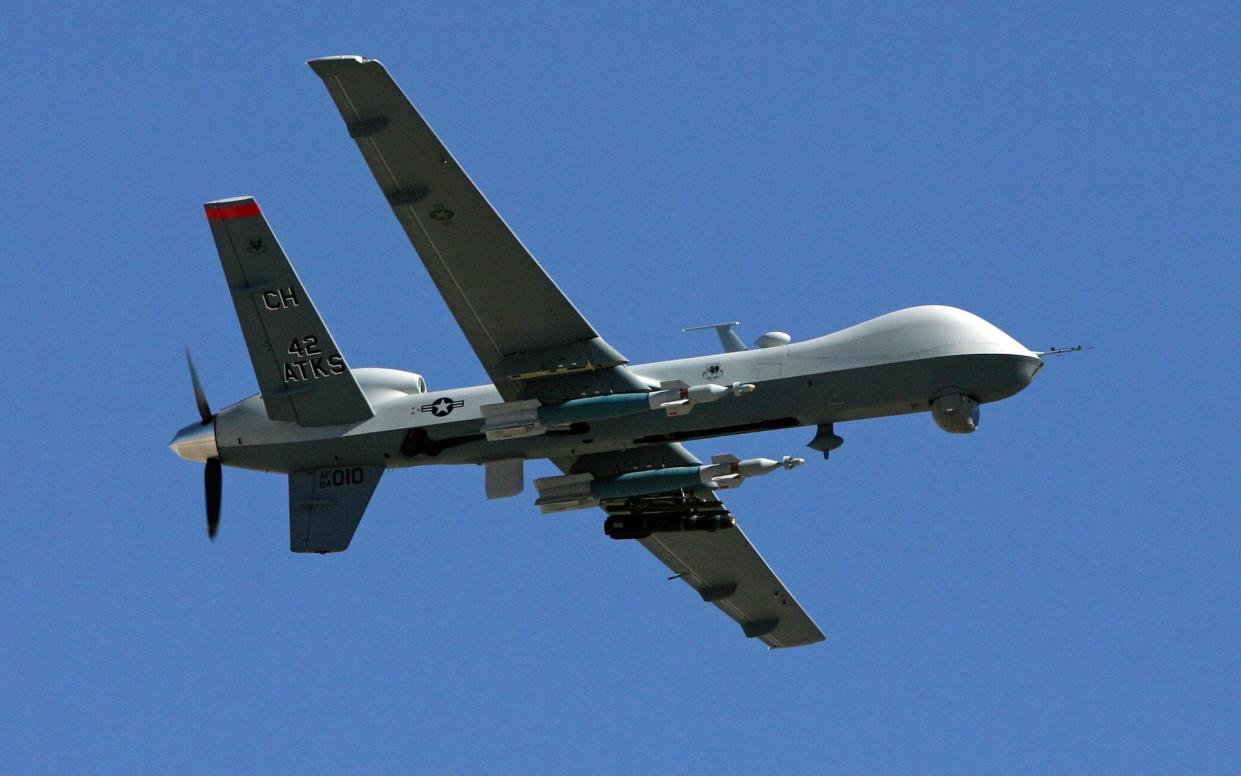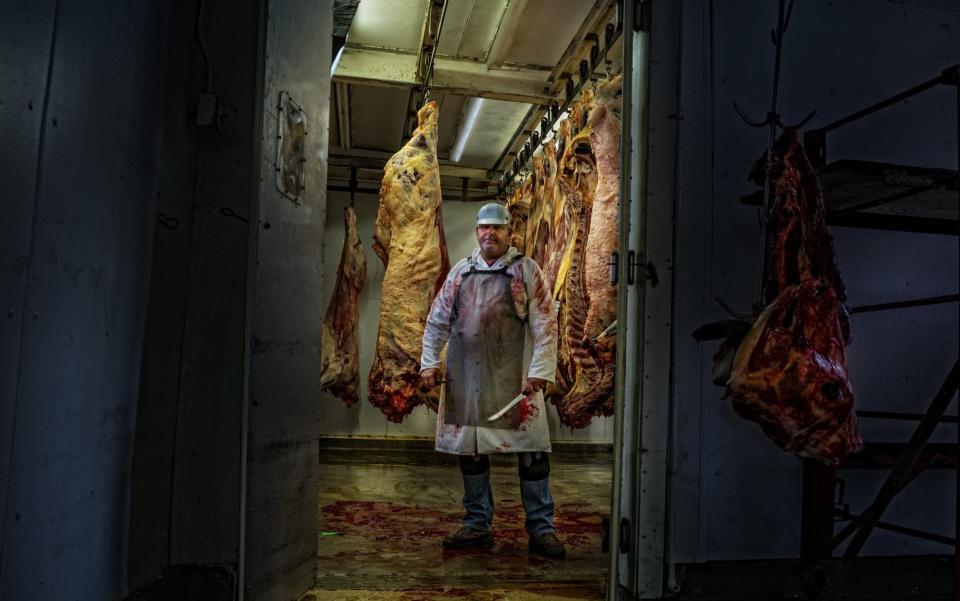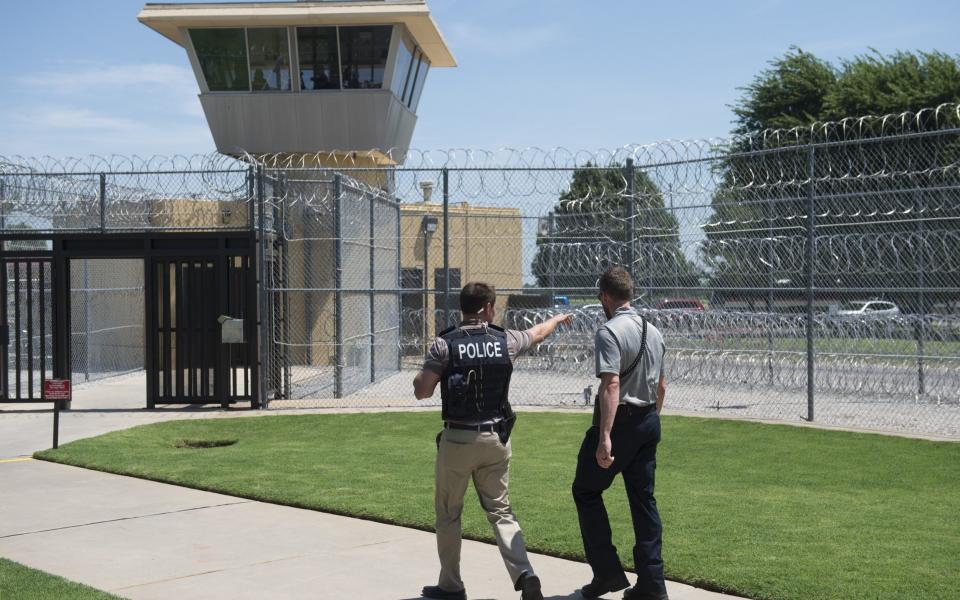Insomnia, panic attacks and death by drone – inside the ‘dirty work’ powering America

Christopher Aaron joined the US military’s Counterterrorism Airborne Analysis Center in 2006, soon after graduating from university. He had been inspired by the shock of seeing 9/11 on TV, and memories of his grandfather’s bravery against the Nazis in the Second World War. He worked 12-hour shifts in a windowless room, deep in a compound in Langley, Virginia; his days were spent staring at greyscale blobs on a pixelated screen. Occasionally, he would be ordered to launch a real Hellfire missile at those blobs.
Piloting a Predator drone, however, is nothing like playing Call of Duty. Despite jibes about their being “joystick warriors”, drone pilots have an intimacy with the enemy that even special forces on the ground rarely match. They watch, sometimes for weeks, targets going about their daily lives: eating dinner, kicking a football, attending a funeral, playing with their children. And they watch as those same children try to piece together their parents’ bodies after a strike.
Aaron spent four years on the programme. It hollowed him out; he suffered from insomnia, panic attacks and nightmares. He became so numb to death that he felt no grief when his beloved grandmother passed away. From his desk in Virginia, he had brought the war on terror to the fields of Afghanistan, 7,000 miles away. Now the war had come to him.
He is one of dozens of employees who appear in Eyal Press’s new book, Dirty Work. Released to acclaim in the US last year, it is already set to be one of 2022’s standout works of non-fiction. Part sociological study, part muckraking exposé, Press – a reporter who has written for The New York Times and The New Yorker – examines those workers who, through political decisions and structural inequality, are forced to pick up the tab for society’s “dirty work”. Press interviews American “dirty workers”, from oil-rig workers and prison guards to abattoir meat-processors – and drone operators.
“The colloquial expression ‘dirty work’ is used for unpleasant tasks which are physically dirtying, like garbage collection,” Press explains over Zoom from New York. “But in my book, it refers to morally troubling activity which society depends upon and tacitly condones.”
Press takes his title from a 1963 essay by the American sociologist Everett Hughes. In Good People and Dirty Work, Hughes, who had travelled to Germany in the immediate aftermath of the Second World War, argued that the Holocaust had been perpetuated not only by the anti-Semitic policies of the Nazi Party, but also the silence of ordinary Germans.
“Hughes calls the Holocaust the most colossal piece of ‘dirty work’ in human history,” Press says. “On one level, his essay seems like a commentary on Nazi Germany. But Hughes saw it as a metaphor that could be applied to other places. He argued that there’s dirty work in all societies, [and] an unconscious mandate from the rest of the population towards those dirty workers.”
In Dirty Work, Press applies Hughes’s analysis to contemporary America. But he is not simply a dispassionate reporter. Press’s grandparents were Romanian Jews who were transported to a work camp in Transnistria during the Second World War. According to family lore, his mother was the first child to be born in the camp. Somehow, unlike many in their family, she survived to immigrate to America.
“I’ve always been fascinated by the question of who helped [in the camps], and who didn’t,” Press explains. “Who carried out orders, and why? And to what extent might people in adjoining villages have known about these camps. On the one hand, we have this impulse to judge – how could you have gone along with this? But, on the other, how differently would I have acted in that situation? I wanted to write about these grey actors who dirty their hands.”
The book took five years to write and research. Gaining access to this shadowy otherworld of the American economy took time. (It was the meat-processing plants, with their fearful workforce largely drawn from illegal immigrants, that were the toughest to crack; by contrast, the US Military were receptive to his enquiries.)

Early on, Press decided not to go undercover. Recently, there has been a spate of books in which writers have embedded themselves in unlovely areas of society. In the UK, James Bloodworth’s Hired (2018) saw the journalist spend six months undercover in, among other places, an Amazon delivery plant and a call centre. In France, Valentin Gendrot’s Flic (2020) exposed the racism and corruption of the Parisian police force, while Joseph Ponthus’s À la ligne (2019) was a striking poetic account of life inside Brittany’s abattoirs and fish-processing plants. Meanwhile, Francisco Cantú’s The Line Becomes a River (2018) was a wrenching memoir of his time as a Latino Border Patrol agent on the US-Mexico border.
Press, though, wanted to write “a more panoramic book, a book which looks at the nature of inequality in America, and how inequality determines who does this work”. Still, his book is troublingly immersive. You smell the rank ooze of a slaughterhouse; you feel the jitters which come right before a drone strike.
He spends months, for instance, with the wife of a young oil-rig worker, Stephen Stone, who survived the Deepwater Horizon disaster. In 2010, a BP oil rig exploded in the Gulf of Mexico, killing 11 men on board and devastating the local ecosystem. Press records how the guilt Stone felt at the destruction weighed upon him, triggering panic attacks and paranoia, until he began to self-medicate with cannabis and alcohol. Eventually, his marriage broke down, his wife unable to deal with his erratic behaviour. The costs of the dirty work he had done metastasised, surfacing years after he quit.
In fact, one of Press’s strongest insights is into the “moral injury” of dirty work. Only some forms of dirty work, such as hacking up carcasses or guarding prisoners, carry physical risk; all, however, seem to traumatise workers in ways which linger, spilling over into their relationships and communities. Press meets a retired prison guard who reflectively sits facing the door so he can pre-empt attack. Aaron, the young drone operator, dreams of dismembered bodies and anguished faces. The work inscribes itself into the workers’ minds as much as their bodies – and its scars do not heal.
“One of the things that made me want to write about drone operators is that they defy our initial assumptions,” Press explains. “You assume that it’s a distant form of warfare, so it doesn’t trouble the conscience of the people who do it. [In fact] the military itself has done studies, and found levels of stress and burnout are very high, because these operators are exposed to extreme violence on a regular basis.”

He continues: “There’s a quote from Camus: ‘You cannot kill unless you are prepared to die.’ But these operators are removed, they’re not risking their lives. It turns warriors into assassins.”
In Dirty Work, Press is scathing about the effectiveness of this “eerie, displaced” form of warfare. He argues it has allowed the US to kill with impunity, but done little to stop the threat from terrorists. Crucially, he says, the drone programmes’ invisibility makes them palatable to US citizens. “Out of sight” is literally “out of mind”.
This holds true for other forms of dirty work. The US has the world’s largest prison population. Rates of criminality have not shot up; rather, Press says, “mental illness has been criminalised in America”. First dedicated asylums, then care-in-the-community programmes were abandoned: the mentally ill were shuffled away behind bars. Today, one in two Americans with a mental illness is incarcerated. And this vast prison population requires an equally large infrastructure to support it: counsellors, psychiatrists and correctional facility officers. This is dirty work, on a country-sized scale.
Like meat-processing plants and offshore oil-rigs, these hubs of dirty work are located far from richer neighbourhoods. They constitute an archipelago of inequality, populated overwhelmingly by poor minorities – African-Americans, for instance, make up almost the same proportion of guards as they do prisoners.
“I hope that for readers in the UK,” Press says, “this is a window into aspects of America that – to outsiders – are troubling and shocking.”
But he cautions that those outside America cannot be complacent. “This is a universal dynamic, it’s not particular to one society,” he warns. “This book is addressed to those good people who don’t ask the hard questions.”
Still, it also offers hope. “Dirty work is not immutable. It is shaped by the values of society and the political choices that have been made – and can be unmade. Once dirty work has been exposed, it can be changed.”
Dirty Work: Essential Jobs and the Hidden Toll of Inequality is published by Head of Zeus today

